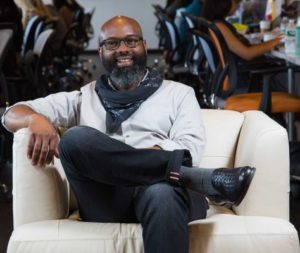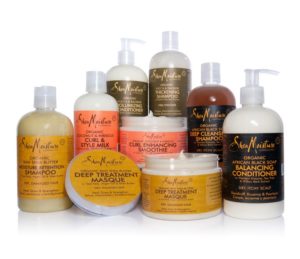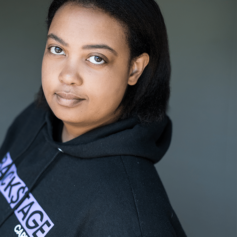
Richelieu Dennis, seen here on Sept. 9, 2015, is CEO of Sundial Brands LLC, co-founded the company in 1992. Photo Credit: Uli Seit
Sundial Brands, LLC is a Black-owned business known for such well-known brands such as SheaMoisture and Nubian Heritage. The Amityville, New York based, family-owned and operated company was founded by immigrants from Liberia and Sierra Leone and employ nearly 300 people. The company has manufactured lotions, soaps, shampoos, skin care and hair treatments since 1992, using raw materials such as shea butter, coconut, herbs and certified organic materials. In addition, the company uses part of their sales to improve Black communities in the U.S., as well as African villages that produce its ingredients and products.
Sundial, which employs nearly 300 people, attracted attention recently with the announcement that Bain Capital LLC, the private equity firm, has invested in the company through a minority stake. The deal underscores the absence of Black-owned private equity firms, and the need for Black businesspeople and entrepreneurs to have access to capital in order to realize their dreams. The deal also underscores the changes that are taking place in the personal-care market. In an effort to expand and bring its products to a global consumer base, Sundial sought a major investor, and it did so without compromising its Black family-based ownership, its mission and values, and commitment to the betterment of the community. In that regard, Sundial—which is valued at $700 million by the Wall Street Journal, with annual revenues of about $200 million—is creating an example for other Black enterprises.
Recently, we spoke with Rich Dennis, CEO of Sundial, about his company and its mission, the new investment deal, and the Black beauty, skin, and hair care market.

Sundial has always been focused on providing natural beauty and wellness products to multicultural consumers and the Black community. And so I think what we we’ve been able to do is build a business that doesn’t just make beauty products but that also invests in our community. I think we are a symbol of pride in those communities. We have shown we’ve always marched to our own drumbeat in not taking the conventional approach that we believe tried to take all Black consumers and lump them in as one monolithic consumer group. Instead, we believe we are the largest consumer group when it comes to the percentage of beauty sales.
However, many brands and companies have not invested the same amount, a proportionate amount of innovation, merchandising, messaging against the needs of African-American consumers and the needs of multicultural consumers in general, but have rather sort of lumped us into one group and said, ‘OK, there’s only one type of product for you, it can only be this price.’ And so, what we endeavored to do is to show a different pathway, to show that if you think about our core consumer as people who have needs beyond the obvious, that you actually have a very large consumer group that can drive the business at the same levels of any other CPG (consumer packaged goods) company. What we have endeavored to do is not just make the best natural brands and products in the marketplace, but to also show a path that other minority owned businesses can make decisions that allow them to be independent and stay true to themselves, but have the resources through which they can compete on a global scale. I’m passionate about this.
Your products have spread in popularity beyond Black women customers to include men and women of other racial and ethnic backgrounds. To what do you attribute that success?
I think as a community and as a culture, the reality of it is that Black culture has been influencing pop culture, forever. And so what you saw is Black women say that they were no longer going to fit the stereotypes that were put out there for what their beauty should be, for what their hair should be. As a brand, we have stood alongside them for 25 years helping them achieve that freedom. I think what happened, as this natural movement has influenced the broader pop culture, that broader pop culture is now adopting and adapting the same sort of freedom to wear their hair as naturally and consume natural products. So, I think at the core of it, it’s the bravery to stand up. I think that Black women [stood] up against the stereotypes that existed for them [and] are now empowering women of other cultures to stand up and say, ‘I want to be natural too,’ and [they] are seeking out the best brands for achieving that. I think this really is a cultural shift that is being led by Black women, and they’re bringing confidence and style to the forefront for other cultures.
Sundial just announced some some big news particularly with the Bain Capital deal. What is the significance of the deal, what does it mean for the company?
I think this deal means more just what it means to our company. I think it means that a family, a minority-owned business can stay true to the vision and mission and attract a partner that allows them to go on the world stage. And it shows a different path. Because all too often, what happens in our communities—you remember Karl Kani jeans, right? What I didn’t want to become and what we didn’t want our business to become was that company that set the innovation for that service, our community around their style, their taste, their individuality to then see it either evaporate, or to see other multinational corporations take those ideas and take those concepts, own them and turn them into large businesses, while our businesses don’t get the same benefit of their innovation.
So, I remember when we were buying Karl Kani jeans on the street. It was the same time I was selling soap on the street. And then one day, I started to walk into the department store, and I saw Tommy Hilfiger with similar styles and fashion. Today I see Tommy Hilfiger, but I don’t see Karl Kani.
What set us on this course was, how do we take something that we’ve innovated, how do we take the consumer in the community that we so care about and put them on the world stage? And find a partner that understands that we’re more than a business—that we’re a mission? And that mission is to create commerce in our communities. We call it community commerce, and so that’s what we set out to do.

We wanted to maintain control of our business. We wanted to retain our management and our family running the business, we wanted the same family owned, but what we also knew was that if we didn’t take the necessary steps to have the finances, the infrastructure and the ability to scale, that we would see other companies that didn’t focus in on our consumers all of these years all of sudden put focus there, and have the resources and the tools to win. We did not want that to happen, and we don’t think that our consumers deserve to have that happen. And so, we made the decision that said we’re going to prepare ourselves, and were going to do the due diligence to find the best partner to allow us to serve our community. And that’s what we did.
This is the first time that Bain has entered into a deal such is this. One would imagine that is a testament to what you have put together and the vision that you have for your company as well as your service to the community.
First of all, like I said, this is this is a big win for our consumers. It’s a big win because it validates the concept that a Black business can rise to the same level of any other business, as challenged as we are for obtaining capital, for access to capital, access to the same opportunities as other entrepreneurial groups, that with a little bit of patience and focus and direction, you can accomplish it on that scale, and not have to compromise your values and your principles.
We think that this is huge for our consumer community. It’s also huge for the minority business community, because it’s very rare that you find a top tier private equity firm doing a minority deal. Extremely rare. And I think that this shows what we as a community can do if we stick together in support of a common cause and a common vision. I think that you will start to see more of these deals happen with the same sort of like-minded entrepreneurs as us.


